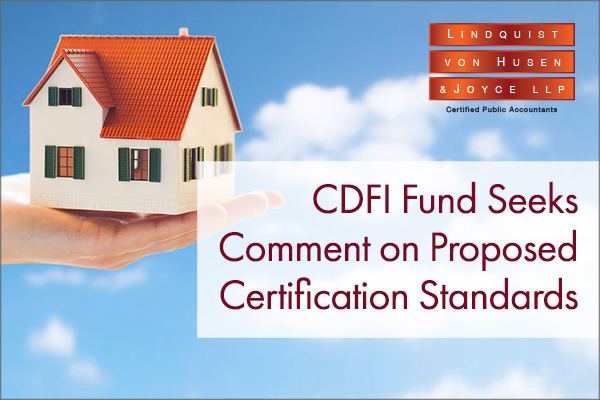
The Community Development Financial Institutions Fund (CDFI Fund) is seeking public comment through August 5, 2020, on proposed changes to the CDFI Certification Application and two additional Certification reports that are intended to improve the process for certifying, evaluating and recertifying CDFIs.
CDFIs are certified by the U.S. Department of the Treasury to deliver capital and credit to families, businesses and communities through programs that include the New Markets Tax Credit Program and the Capital Magnet Fund. Many not-for-profit entities that focus on community development, such as the affordable housing industry, benefit from this fund and the certified CDFIs in their communities.
Revisions are based on the CDFI Fund’s five policy objectives:
- Continue to foster a diversity of CDFI types, activities, and geographies;
- Support the growth and reach of CDFIs, especially as it relates to their ability to innovate and take advantage of new technologies;
- Protect the CDFI brand;
- Minimize burden on CDFIs while improving data quality and collection methods; and
- Promote efficiency for CDFI Fund staff in rendering CDFI Certification determinations.
Proposed Elimination of Restriction on Target Markets
One major proposal is elimination of geographic restrictions on most Target Markets.
Currently, if a CDFI engages in activity outside of its approved Target Market area — even if it’s investing in activity that otherwise qualifies as eligible Target Market activity — the CDFI Fund does not count that activity when measuring the CDFI’s adherence to the Target Market test. Feedback has noted that this geographic approach inhibits CDFI growth.
By allowing CDFIs to serve Target Markets at their levels of capability, it will promote growth and eliminate a perceived restraint on recertification.
Streamlined CDFI Annual Certification and Data Collection Report (ACR)
The CDFI Fund is also seeking public comment on revisions to the Annual Certification and Data Collection Report (ACR) as the first step in aligning requirements for existing CDFIs with the application process for new CDFIs. The process is also designed to improve data collection on how CDFIs are best serving distressed or underserved populations.
Standardization will occur in part with the introduction of the new Certification Transaction Level Report, which will collect a complete year of loan and investment origination data for new CDFI Certification Applicants, as well as for Certified CDFIs that are not current FA Award Recipients (those recipients already submit the more extensive Transaction Level Report as part of their award commitments).
According to the CDFI Fund Director Jodie L. Harris in a recent news release,
“Having a greater sense of the CDFI industry will serve to build awareness; illustrate and evaluate the comprehensive effects of CDFIs in distressed communities; better assess and target financing gaps and needs; as well as aid in attracting new sources of capital. We also hope that CDFIs will be able to use the data collected by the CDFI Fund to assist in their own planning and strategy development.”
To review all documents and comment on certification revisions, go to the CDFI Fund special page set up for this purpose. The CDFI Fund has extended comment to 90 days rather than its usual 60 days.
LvHJ provides tax, attest and business advisory services to not-for-profits and affordable housing entities focused on community development and underserved populations. Let us know if you have questions about funding alternatives and accounting for funding.
You may also be interested in our blog post about changes to LIHTC partnerships under the Coronavirus Aid, Relief, and Economic Security Act (CARES Act).








